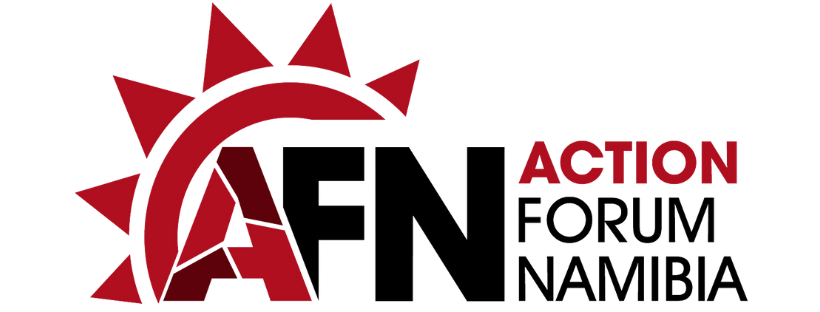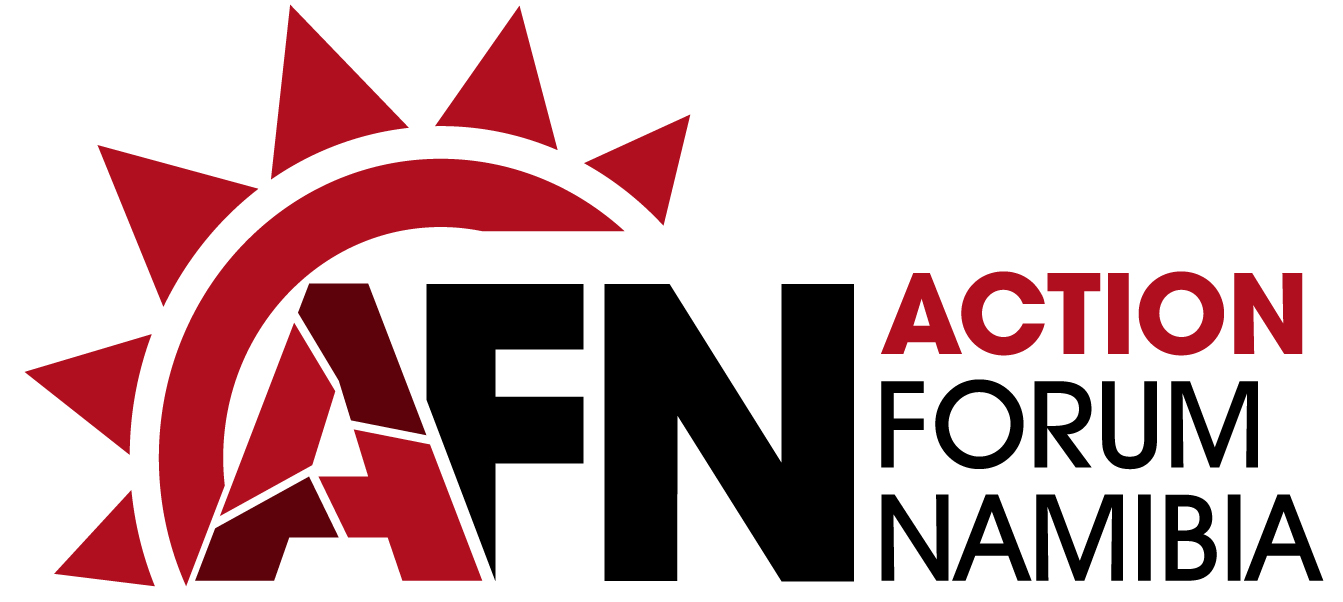Holding Government
Accountable to the People
AFN is a voluntary, non-profit civil rights movement for all Namibians irrespective of origin, appearance, culture, religion or sexual orientation.

OUR MAIN OBJECTIVES ARE TO:

COMMUNICATE
To continuously inform, in a simple and understandable manner, our members and the general public about government policies and practices.

MONITOR
To, on behalf of the general public, monitor government polices and practices and assess to what extend they conform with the Constitution.

INVESTIGATE
To identify issues and concerns in terms of legislation, policies, procedures and practices. Provide possible solutions to amicably address the concerns

ACT
To take appropriate actions that include:
•Media
•Address Parliament •Address City/town councils
•Direct with GRN
•Public group discussions International

COMMUNICATE
To continuously inform, in a simple and understandable manner, our members and the general public about government policies and practices.

MONITOR
To, on behalf of the general public, monitor government polices and practices and assess to what extend they conform with the Constitution.

INVESTIGATE
To identify issues and concerns in terms of legislation, policies, procedures and practices. Provide possible solutions to amicably address the concerns

ACT
To take appropriate actions that include:
•Media
•Address Parliament •Address City/town councils
•Direct with GRN
•Public group discussions International
THE NAMIBIAN DREAM

AFN Promotes the Namibian Dream of:
1. A Decent Job
2. Proper & Affordable Education for all
3. Affordable & Quality Health Care for all
4. The right to a Dignified Retirement
5. Protected against criminals, economic exploiters and public scams
Dr Frikkie Engelbrecht Afrigting - Kletskompas 6 September 2023
Dr Frikkie Engelbrecht Kletskompas 3 Julie 2023
A replay of the Kletskompas interview with Dr Frikkie Engelbrecht
Watch our interview with Kletskompas
NEWS

Equal opportunities and quality in secondary education - Part 2
Equal Opportunities And Quality In Secondary Education, Part 2
Overview
In the first article on this topic about Namibian secondary education, it was indicated that the local secondary curriculum does not provide equal opportunities for good education to all learners despite that promise in the Constitution. Several types of intelligences are not provided for in the curriculum, and a lack of facilities, and resources in schools, also cause discrimination against equal and quality education. The current academic driven curriculum, with its focus on conveying knowledge, needs to be supplemented by another curriculum that provides for learners with different intelligences, such as the artistic, physical, practical, spiritual emotional and social intelligence.
Part 2: Equal Opportunity In The Junior Secondary Curriculum
Analysis of the 2020 Namibian Junior Secondary curriculum (gr 8-9)

Discussion of the 2020 Junior Secondary (grade 8-9) curriculum
The junior secondary phase is part of ‘basic education’ and thus requires a ‘general broad education’ which creates a basis for further specialisation in the senior secondary phase. Seven promotional subjects and 3 of the Support Subjects (Life Skills, RME, Arts) are already a very full load of 10 subjects, so the proposed 14 subjects are unacceptable from a pure learning load perspective. (Overload is a typical fault of an academic knowledge conveying curriculum).
In addition, the pre-vocational curriculum is supposed to be an alternative curriculum to the academic one by offering career related information. To add some ‘pre-vocational’ subjects on top of the full academic curriculum is not an alternative to the academic curriculum. It is in fact not recognising the multiple intelligences (abilities and interests) of different learners, and it is rare that the same learner has an equally strong academic and practical intelligence. Therefore the whole section of ‘two elected promotional pre-vocational subjects’ should be eliminated.
UNESCO (2012: 237) advises that career education starts from grade 10, thus the end of junior secondary phase, since learners are far too young to make career choices at grade 8 or 9. Learners should rather receive career guidance to discover their interests and how to select a particular job/ career, instead of taking pre-vocational subjects. Together with the basic academic core subjects learners take a subject of ‘Career Exploration’ from the beginning of grade 8. This subject can explore a new occupational area per term, for both grade 8 and 9. That way they can be introduced to 6 selected Occupational areas such as: Human Services careers; Business Management and Administration; Marketing and Sales careers; Government and Public Administration; Transportation, Distribution and Logistics careers; Architecture and Construction; Education and Training careers; Health Science Careers; Hospitality and Tourism careers; and Information Technology careers. (Local jobs and info, 2021). These occupational areas offer modern jobs and cater for both genders and practical intelligence.
Subjects such as Design and Technology, Fashion and Fabrics and Technical Studies A-C are thus not appropriate for the new purpose of the career exploration programme. The proposed two promotional vocational subjects are thus also not acceptable, and their time should be allocated to the Support Subjects, especially Life Skills, RME and Career Exploration.
From grade 10 onwards learners then select their discovered job of interest from a job area. The motivation, and thus productivity of employees, will be much higher if employees actually perform work that match their abilities and interests, instead of doing any kind of job to survive financially.
Life Skills and RME should be promotional subjects, not Support Subjects, because of their huge importance to prepare learners to be decent citizens and to develop crucial life skills. (Only promotional subjects receive proper periods and formal examination).
Some core content of the subject ‘Information and Communication’ can be incorporated under Life Skills to create periods for the Career Exploration as a Support subject.
The value of Arts (music, visual art, drama and singing), and Sport facilities in schools can no longer be ignored, and schools need to receive the relevant facilities, equipment and materials, to provide the aesthetic and physical intelligence education.
Note: A 7-day timetable is not adding more teaching time spent on a subject, so all schools could simply follow a 5-day cycle without the complicated administration of a 7-day timetable. A school day from 7:15 till 13:15 has 6 hours or 360 minutes. 8 Periods per day (or 40 periods per week on the timetable) would amount to 320 minutes per day. The remaining 40 minutes is enough for a break but there are 3 periods short. That means to fit 43 periods into a 5-day week, the periods must be shorter and/ or total of periods for some subjects must be one less period. Periods of 35 minutes long create 9 periods per day and 45 per week. Each day has then 45 minutes left on top of the 9 periods for school opening and breaks.
Proposal for a new Junior Secondary equal opportunity curriculum
Namibia does not need a ‘cosmetic-pre-vocational’ curriculum, but rather a ‘quality-of life-career-curriculum’. The new junior secondary (gr 8-9) career-oriented curriculum features are as follows:

8 periods per day of 40 minutes each, plus 45 minutes for opening and breaks
Thus 40 periods per week. On the day of Physical education all periods can be reduced to 35 minutes if needed to fit all subjects in.
Clarification and discussion of the new junior secondary equal opportunity curriculum
The general broad education of the junior secondary phase is expanded to include Business Studies or Economics or Accounting, which allow for individual interests and ability.
Instead of making both History and Geography compulsory, learners can now choose between them to allow for individual interests.
The 7 core promotional subjects are now 9, because Religious and Moral Education (spiritual intelligence) and Life Skills (social, emotional, practical and environmental intelligence) are promoted from ‘support’ to ‘promotional’ subjects. The Life Skills subject should also include development of general employability skills, (practical intelligence) values and attitudes (spiritual intelligence) as attributes of the ideal employee. Life Skills should also develop health (physical intelligence); social skills (environmental and emotional intelligence); management skills of planning, organizing and monitoring of progress, and other thinking skills (academic intelligence).
All the pre-vocational promotional subjects are taken out of the junior secondary curriculum since international and UNESCO (2012: 237) perspectives address the multiple intelligences (abilities and interests) of learners from grade 10.
'Career Explorations’ is added as a subject to provide career guidance to discover their interests and how to select a particular job/ career) in areas such as Human Services careers, Business Management and Administration, Marketing and Sales careers, Government and Public Administration, Transportation, Distribution and Logistics careers, Architecture and Construction, Education and Training careers, Health Science Careers, Hospitality and Tourism careers, and Information Technology careers. (Local jobs and info, 2021).
These occupational areas offer modern jobs and cater for both genders. The Career Explorations includes career guidance discussions, virtual or real visits to workplaces, aptitude tests, passion and personality tests, projects and explorations of what particular jobs entail, some practical activities of the job areas, entrepreneurial knowledge, as well as general employability skills. In addition, Guest speakers from the different job areas offered in a school can be invited, to bring the work reality to the classroom. DVDs and job related materials should also be available to teachers in schools.
Instead of having ‘Information and Communication’ as separate subject, some core content of the subject could be incorporated under Life Skills (which now has 4 periods per week) to create a period for the more important Career Exploration as a Support subject.
The value of Arts and Sport facilities in schools can no longer be ignored, and schools need to receive the relevant facilities, equipment and materials to provide this education.
The reading exercises should naturally be part of language lessons, and not a separate period.
If the above ‘equal opportunity’ curriculum is made applicable to both the academic and the job exploration stream, it could make the timetable more practical. But more important, the quality of education is raised.
Additional changes that are needed to improve the quality in schools, is the teaching to understand, instead of memorising knowledge; teaching learners proper study methods; more textbooks for learners; raising the standards and passing percentages of examinations; performance appraisals of teachers every second year; disciplinary actions against teachers that underperform; learner feedback forms for teachers every six months and more funds for schools to implement these changes; the management of schools is audited every second year and actions taken to rectify discovered problematic areas.
The next article, Part 3 of this series, will deal with how the senior secondary job-oriented curriculum should be designed to promote equal opportunity, and improve the quality of education.
Dr. Frikkie Engelbrecht
Windhoek, Namibia
Email: dr.ugro3906@gmail.com
References
NIED. 2020. Basic education curriculum reform. Okahandja: NIED.
Local jobs and info. 2021. Hyperlink [https://www. Recruiter.com/careers.html]. January 13, 2021.
UNESCO. 2012. Youth and skills: Putting education to work. EFA Global Monitoring Report. Paris:UNESCO.
Office: c/o Sam Nujoma + Hosea Kutako Drives, Windhoek
Call +264 81 277 3982
Email: actionforumnamibia@gmail.com
